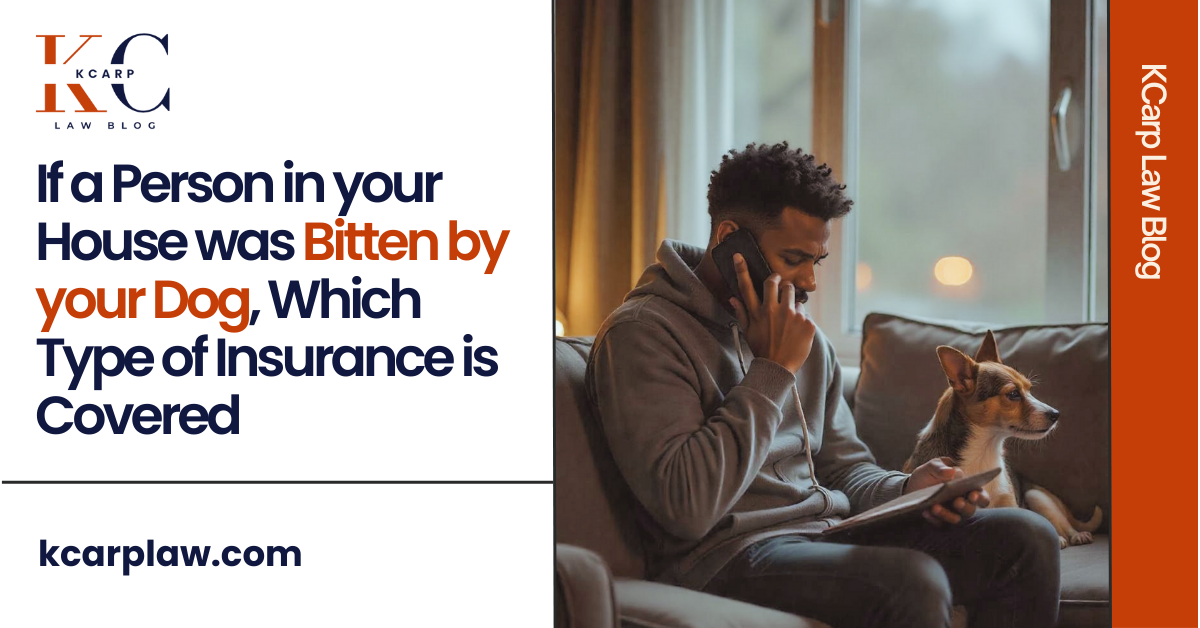A dog bite can turn a peaceful evening in your Springfield bungalow or Chicago North Side condo into a rush of fear, medical bills, and hard questions. Illinois imposes strict liability on dog owners, and the state logged 837 insurance claims totaling $61.8 million in 2023—one of the highest tallies in the nation. Knowing which policy steps up first helps you protect your loved ones and your finances.
What Insurance Covers a Dog Bite at Home in Illinois?
Your homeowner’s or renter’s liability coverage almost always handles injuries your dog causes on your property. These policies pay third-party medical bills, lost wages, pain and suffering, and even your legal fees—up to the stated limit, typically $100,000 – $300,000. A small “medical payments” provision (often $1,000 – $5,000) can cover urgent care quickly without assigning fault. Health, life, or disability insurance do not pay liability damages; they protect the injured person directly, not the dog owner.
Does Illinois Law Hold Dog Owners Strictly Liable for Bites?
Yes—under 510 ILCS 5/16, you are responsible whenever your dog injures someone who is lawfully on public land or on your property and who did not provoke the animal. Illinois rejected the old “one-bite rule,” so the victim never has to prove you knew the dog was dangerous. You have two years from the incident to settle or file suit, and state law requires reporting the bite to local animal control within 24 hours.
How Do Homeowners and Renters Policies Handle Dog-Bite Claims?
After emergency care, the victim sends medical bills and other losses to your insurer. The carrier investigates, negotiates, and pays up to the liability limit—about $48,000 per claim on average in Illinois. If costs exceed the limit, the unpaid balance becomes your personal responsibility unless you have additional coverage. Because many dog-bite injuries involve facial scarring, reconstructive surgery, and counseling, maxing out a policy is common.
Typical claim flow
- Victim’s attorney sends a demand package to your carrier.
- Adjuster reviews fault, provocation, and breed exclusions.
- Settlement is reached or the case proceeds to court.
What If Medical Bills Exceed the Policy Limit?
An umbrella liability policy adds $1 million + in coverage once the underlying homeowner or renter limit is exhausted. Severe wounds, multiple surgeries, or lifelong care can trigger this extra layer. Owners of large or “high-risk” breeds often buy umbrella or stand-alone animal liability coverage for peace of mind.
How Do Breed Exclusions Affect Your Coverage?
Many insurers refuse or restrict coverage for pit bulls, Rottweilers, German Shepherds, Dobermans, and similar breeds. If your policy excludes your dog, a claim may be denied outright. Failing to disclose the breed when you buy insurance can be treated as fraud and void the policy. Your options include:
- Shop carriers with friendlier underwriting.
- Buy specialty pet-liability insurance.
- Add a high-limit umbrella that accepts all breeds.
Without coverage, every dollar of damages comes from your pocket.
What Steps Should You Take Immediately After a Dog Bite?
- Seek medical care. Prompt treatment prevents infection and documents the injury.
- Report the bite. Call animal control and arrange the required vet check within 24 hours.
- Document everything. Photograph wounds, save medical bills, and gather witness names from the porch on I-88 in Naperville to the basement in a Springfield suburb.
- Notify insurance. Contact your carrier; honesty speeds coverage.
- Avoid statements. Do not admit fault, and the victim should not accept early low offers.
- Consult an attorney. Serious injuries merit legal guidance on damages and deadlines.
Which Bite Scenarios Are Common—and Which Are Rare—in Illinois Homes?
- Neighbor or invited guest in your living room: Homeowner liability applies.
- Child reaches toward dog’s food bowl in a Chicago townhouse: Still covered, though supervising pets around kids is wise.
- Delivery driver stepping off the porch: Covered; postal carriers are frequent Illinois claimants.
- Contractor repairing a sump pump in your Springfield basement: Covered; workers’ comp may pay first, but liability still attaches.
- Roommate’s overnight guest bitten while asleep: Covered because the guest had permission to be there.
- Dog lunges from your yard onto a public sidewalk near North Lake Shore Drive: Liability coverage follows the dog; location does not defeat the claim.
Unusual cases—such as a bite inside your SUV, a nipped UPS driver climbing out of the truck, or a playdate mishap at a Naperville cul-de-sac—are also generally paid through homeowner or renter liability.
What Can You Do If the Insurance Company Denies the Claim?
Denials usually hinge on breed exclusions, alleged provocation, or missing paperwork. Read the policy carefully, supply any missing records, and contest errors in writing. Even if the carrier refuses to pay, Illinois courts can still hold you personally liable for all damages, so exploring other policies or settlement funds remains critical.
How Can Illinois Dog Owners Avoid Coverage Gaps Before a Bite Happens?
Review your policy at least annually—think of it like changing your clocks for daylight-saving time. Disclose every dog and breed honestly, raise liability limits if children often visit, and price umbrella or pet-liability policies before hosting summer barbecues in Naperville or birthday parties along Route 66 in Springfield. Renters should carry their own liability protection even when a landlord also has coverage.
What Legal Remedies and Next Steps Are Available to Bite Victims?
Victims may sue under Illinois’s strict-liability statute for medical costs, lost wages, pain, scarring, and emotional trauma. Most claims settle directly with the insurer, but if negotiations fail, a personal-injury lawsuit must be filed within two years. Attorneys typically work on contingency, meaning no upfront fees for the injured person. Early legal help preserves evidence and maximizes compensation.
Remember
Homeowner or renter liability insurance is the first—and often best—source of payment when someone is bitten inside your Illinois home. Strict liability law, high average payouts, and frequent claims make proactive coverage essential. By disclosing your dog, choosing the right limits, and acting quickly after an incident, you protect both the injured person’s recovery and your family’s financial future.

